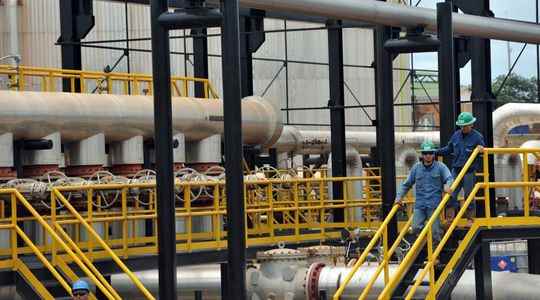Its pipelines meander as far as the eye can see between wells and silos, on the red earth of the plains bordering the Meta River. The size of five times Paris, Campo Rubiales is Colombia’s largest oil field. Some call it the “jewel in the crown” with its refinery which, lately, has been running almost at full speed. And the future looks bright, as the war in Ukraine could lead to a sustained increase in production.
The question of energies was invited in the presidential campaign, the first round of which takes place on May 29. Ex-mayor of Bogota and former guerrilla, the favorite Gustavo Petro wants to turn the page on fossil fuels by preventing any new oil exploration and banning coal extraction. A posture criticized by his conservative rival Federico Gutiérrez and by industrialists. The latter even filed a lawsuit against Petro, calling his speech “an attack on the dignity and honor” of professionals in the sector.
Third largest producer in Latin America
Better known for its coffee than for its oil, Colombia is the third Latin producer behind Brazil and Mexico but ahead of Venezuela, which has the largest reserves in the world but whose production has collapsed. If two-thirds of the fuel is consumed in this country of 51 million inhabitants, the rest is exported to Asia and the United States. Black gold already represents 3.3 points of GDP and 40% of exports. But since the start of the Ukrainian conflict, local oil companies have been nurturing new ambitions.
“The American and European sanctions against Russian oil constitute an opportunity for Colombia”, rejoices Nelson Castañeda, president of Campetrol, an organization which brings together dozens of companies. In 2021, the United States bought an average of 670,000 barrels of Russian oil per day against 203,000 barrels from Colombia. Today, Colombia would see itself replacing Russia. In March, the Biden administration asked Ivan Duque to increase his exports. The conservative president assured that his country could “very soon” produce 1 million barrels per day, against 750,000 today.
Only problem, the infrastructures are already saturated. “We cannot increase production overnight, explains Julio César Véra, president of the XUA Energy Foundation. We need time to invest in wells, to extract and sell the oil. However, we can increase our production of 50,000 barrels within six months.” Moreover, the work has already begun. “In 2022, we will dig more than 500 exploratory wells”, assures Felipe Bayon, president of the giant Ecopetrol, which produces 60% of Colombian oil.
The businessman is eyeing offshore gas and shale oil. Since the start of the war, he has multiplied media interventions to underline “the importance of ensuring energy security” and to recall that unconventional deposits can guarantee it “for decades”. The Colombian Petroleum Association, which federates producers, has meanwhile warned that given the conventional reserves estimated at six years, “Colombia will have to import oil in 2028” if the state prohibits any new exploration.
Ecological nonsense
In the meantime, Ecopetrol has undertaken to drill in a new deposit discovered in the Caribbean Sea. Excavators and bulldozers were also ready to go into action at the end of March in Puerto Wilches (northeast), after the firm obtained approval from the environmental authority for a shale oil extraction project. But, wham! Permission granted through a government-backed fast-track process was suspended by a court because local residents had not been consulted.
The industrialists may well promise that, if the State authorizes them to exploit these new deposits, they will reinvest these revenues in clean energy, but the scientists cry out for ecological nonsense. “To assert that hydrocarbons can serve the energy transition is a conceptual error, reacts Felipe Corral, energy specialist. This amounts to making believe that we can use fossil fuels without releasing greenhouse gases. ”
A researcher in Bogota at the Stockholm Environment Institute, José Antonio Vega adds: “The sums invested in hydrocarbons are as much less funding for renewable energies.” If Gustavo Petro wins on May 29 and June 19, the situation could change. The 62-year-old candidate promises to ban the exploitation of unconventional deposits and to focus on solar and wind turbines. In the meantime, the price of a barrel is soaring and black gold tycoons are dreaming of an El Dorado.
